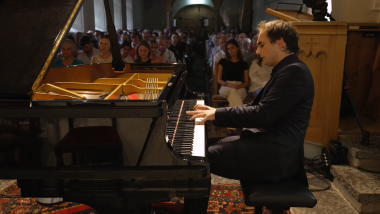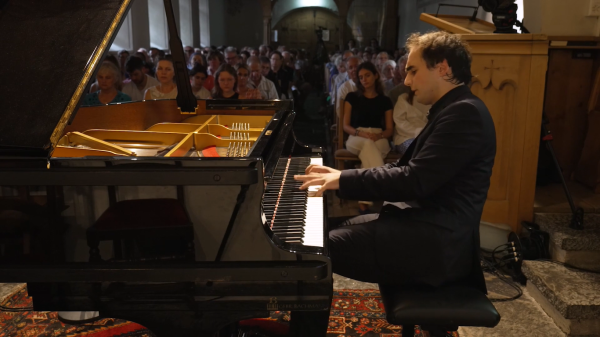 Switzerland Gstaad Menuhin Festival [1] – Bach/Busoni, Chopin, R. Schumann, Matinée des Jeunes Étoiles VII: Illia Ovcharenko (piano). Gstaad Chapel, Gstaad, Switzerland, 28.8.2023. (CC)
Switzerland Gstaad Menuhin Festival [1] – Bach/Busoni, Chopin, R. Schumann, Matinée des Jeunes Étoiles VII: Illia Ovcharenko (piano). Gstaad Chapel, Gstaad, Switzerland, 28.8.2023. (CC)

J. S. Bach/Busoni – Nun komm der Heiden Heiland, BWV 659 (c.1748, arr. Busoni)
Chopin – Scherzo No.2 in B-flat minor, Op.1; Nocturne in E minor, Op.72/1; Polonaise in A-flat, Op.61 (1841)
R. Schumann – Kreisleriana, Op.16
The Gstaad Menuhin Festival’s series of recitals for young and upcoming performers is one of its strongest traits and, along with its Academy, reflects its support of talent. The previous recital I heard this summer was somewhat disappointing (Yoav Levanon on October 5 in this same venue, review here); not so Illia Ovcharenko’s performances of core repertoire (recording available here). This is a musician of the highest order: the real deal, as they say.
Ovcharenko is still a pupil at the Hochschule für Musik, Theater und Medien in Hanover; his teachers include Arie Vardi in Tel Aviv (who lists Yefim Bronfman among his previous pupils) and one of the most musical of young, established pianists today, Francesco Piedmontesi. Having heard this recital, Ovcharenko’s success in the 2022 Honens International Piano Competition. comes as no surprise.
The Bach/Busoni was magnificent. This chorale prelude was a favourite for transcription onto piano – arrangements exist by both Friedman and Feinberg, for example. Busoni’s is the one that tethers itself most to Bach’s original though. Busoni’s patina of darkness radiated from Ovcharenko’s performance like rays from a black sun, textures nicely projected, registral terracing making its point. Ovcharenko clearly has affinity with Bach via Busoni: his performance from the semifinals of the Honens competition of the Bach/Busoni Mein Seele bangt und hofft zu dir from the Elegien (a piece which does go well off-piste) was remarkably powerful and is available here.
A pity applause was immediate, as it would have been nice to move either straight on to Chopin, or to relish the moment. There was a small change in the advertised order of programme, the Polonaise and Scherzo swapping places, with the B-flat minor Scherzo immediately following the Bach/Busoni.
So, from the linear concentration of Bach/Busoni to the world of the Romantic gesture: this was a wide-ranging Chopin performance that married power with what sounded like a search for dance at various points. The chordal section was just lovely, the voice-leading immaculate; in the more virtuoso sections, finger strength and therefore note definition was ideal. The E minor Nocturne, Op.72/1 was appropriately beautiful, but heard in a performance that also acknowledged Chopin’s adventurous harmonic twists. The A-flat Polonaise once more brought out dance allusions. The left-hand octaves are of course the challenge of this piece, and Ovcharenko was in total control. But most notable of all was the more lyrical contrasting section, which in Ovcharenko’s hands sounded almost modern. Truly extraordinary.
The concert finished with Robert Schumann’s Kreisleriana – a massive interpretative, as well as technical, challenge. Again, Ovcharenko’s Honens performance is available on his own website, and is excellent, but his Gstaad performance tops it in terms of sheer natural flow coupled with a virtuosity that seems built to reveal Schumann’s intentions. Ovcharenko’s rubato is natural, his realisation of sudden contrasts as at the heart of Schumann’s expressive vocabulary is there for all to hear. On occasion, he plays passages perfectly evenly, non-interventionally, letting the music speak perfectly for itself, and when he does so the result is purest magic. His pedal work, too, is exemplary, from creating a sheen of sound, to almost no pedals involved at all. Most impressive is his ability to think in long paragraphs in the more lyrical sections; silences, as a result, were rapt. A simply magnificent performance, one of the best accounts of this piece I have ever heard.
One encore, a Scarlatti Sonata, the B minor (Kk 87), limpid and perfectly judged. Illia Ovcharenko is a name to watch, for sure.
Colin Clarke
